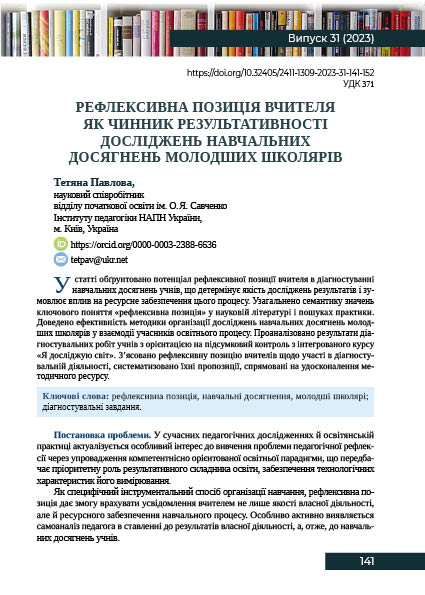The Reflexive Position of the Teacher as a Factor of Educational Achievements of Primary School Students

Published 2024-01-17
Keywords
- reflexive position,
- educational achievements,
- primary school students,
- iagnostic tasks
How to Cite

This work is licensed under a Creative Commons Attribution-NonCommercial-ShareAlike 4.0 International License.
Abstract
The article substantiates the potential of the reflexive position of the teacher in diagnosing the educational achievements of students, which determines the quality of researching results and induces the impact on the resource provision of this process.
The semantics of the meanings of the key concept “reflexive position” in the scientific literature and researches of practice are summarized. The effectiveness of the methodology of organizing studies of educational achievements of primary school students in the interaction of participants in the educational process has been proven. The results of the students’ diagnostic works were analyzed with a focus on the final control from the integrated course “I Explore the World”. The reflexive position of teachers regarding participation in diagnostic activities was clarified, and their suggestions aimed at improving the methodological resource were systematized.
The works on the problem of teacher reflections as a component of professional activity is summarized. The content of the teacher’s reflective analysis of pedagogical situations is specified, which consists in understanding the context of both one’s own actions and other subjects of educational interaction. The conditions are characterized under which reflexive actions of the teacher are revealed, and the implementation of such conditions is ensured during the study of the effectiveness of educational achievements of primary schoolchildren.
For this purpose, a set of diagnostic tasks was developed to identify competencies at a certain stage of education. In the process of preparing the tasks for monitoring and evaluating the educational achievements of students in primary school, we focused on the requirements for the content of the tasks, the scope of the tasks for students, their types according to procedural characteristics (tests), the organization of diagnostic procedures, their duration, etc. The diagnostic tasks are coordinated with the program content of each of the topics of the integrated course “I Explore the World” in accordance with the requirements of the State Standard for Primary Education. Within each type, there are tasks that determine the reproductive level of performance (reproduction, recognition of the objects of study); as well as tasks aimed at students’ search activity, which involve combining information, methods of activity to obtain new knowledge (complement, add, etc.). The results of performing diagnostic tasks based on the results of the cycles of primary education are summarized; the students’ positive attitude towards the content of the tasks and the execution process was noted, namely: the students went beyond the limits of the answer regulated by the test, supplemented it with pictures.
The range of completed works shows the higher results of tasks, the solution of which required a connection with the life experience of children, the use of search actions.
The involvement of teachers in the reflexive analysis of the results of the educational achievements of primary school students proved the effectiveness of joint assessment of the process of research and the development of ways to overcome methodological problems.
Downloads
References
- Бібік, Н. М., Ващенко, Л. С., та ін. (2004). Компетентнісний підхід у сучасній освіті: світовий досвід та українські перспективи (бібліотека з освітньої політики): колективна монографія. Київ: К.І.С.
- Державний стандарт початкової освіти (2018). Затверджений постановою Кабінету Міністрів України від 21 лютого 2018 р. № 87 https://zakon.rada.gov.ua/laws/show/688-2019-%D0%BF#Text
- Кравчина, Т. (2022). Рефлексивна позиція педагога: методи і прийоми рефлексії педагогічної діяльності. Освіта. Інноватика. Практика, Т.10, №7, С. 39‒43. https://oip-journal.org/index.php/oip/article/view/70/70
- Кремень, В.Г. (2021). Енциклопедія освіти. 2-ге вид., доповнене та перероблене. Київ: Юрінком Інтер.
- Марусинець, М. М. (2012). Система формування професійної рефлексії майбутніх учителів початкових класів: дисертація доктора педагогічних наук: 13.00.04. Київ.
- Онопрієнко, О.В. (2020). Інструментарій оцінювання результатів компетентнісно орієнтованого навчання молодших школярів: методичний посібник. Київ: КОНВІ ПРІНТ. https://undip.org.ua/library/instrumentariy-otsiniuvannia-rezultativ-kompetentnisno-oriientovanoho-navchannia-molodshykh-shkoliariv-metodychnyy-posibnyk/
- Опалюк, Т. (2019). Дидактичні засади формування соціальної рефлексії майбутніх учителів у процесі вивчення гуманітарних дисциплін: дисертація доктора педагогічних наук: 13.00.09. Київ.
- Осадченко, І. І. (2012). Теорія і практика ситуаційного навчання у підготовці майбутніх учителів початкової школи: монографія. Умань: ПП Жовтий.
- Пометун, О. (2012). Методика розвитку критичного мислення на уроках історії. Історія і суспільствознавство в школах України: теорія та методика навчання, 4, 8‒13.
- Савченко, О. Я. (2012). Дидактика початкової школи: підручник для студентів педагогічних факультетів. Київ: Генеза.
- Савченко, О.Я. та ін. (2012). Дидактико-методичне забезпечення контролю та оцінювання навчальних досягнень молодших школярів на засадах компетентнісного підходу: монографія. Київ: Педагогічна думка
- Топузов, О.М. (ред.), Онопрієнко, О.В. (уклад). (2023). Діагностика та механізми подолання втрат у навчанні молодших школярів. Методичні рекомендації. Електронне видання. Київ: Інститут педагогіки НАПН України, 2023. https://lib.iitta.gov.ua/736336/
